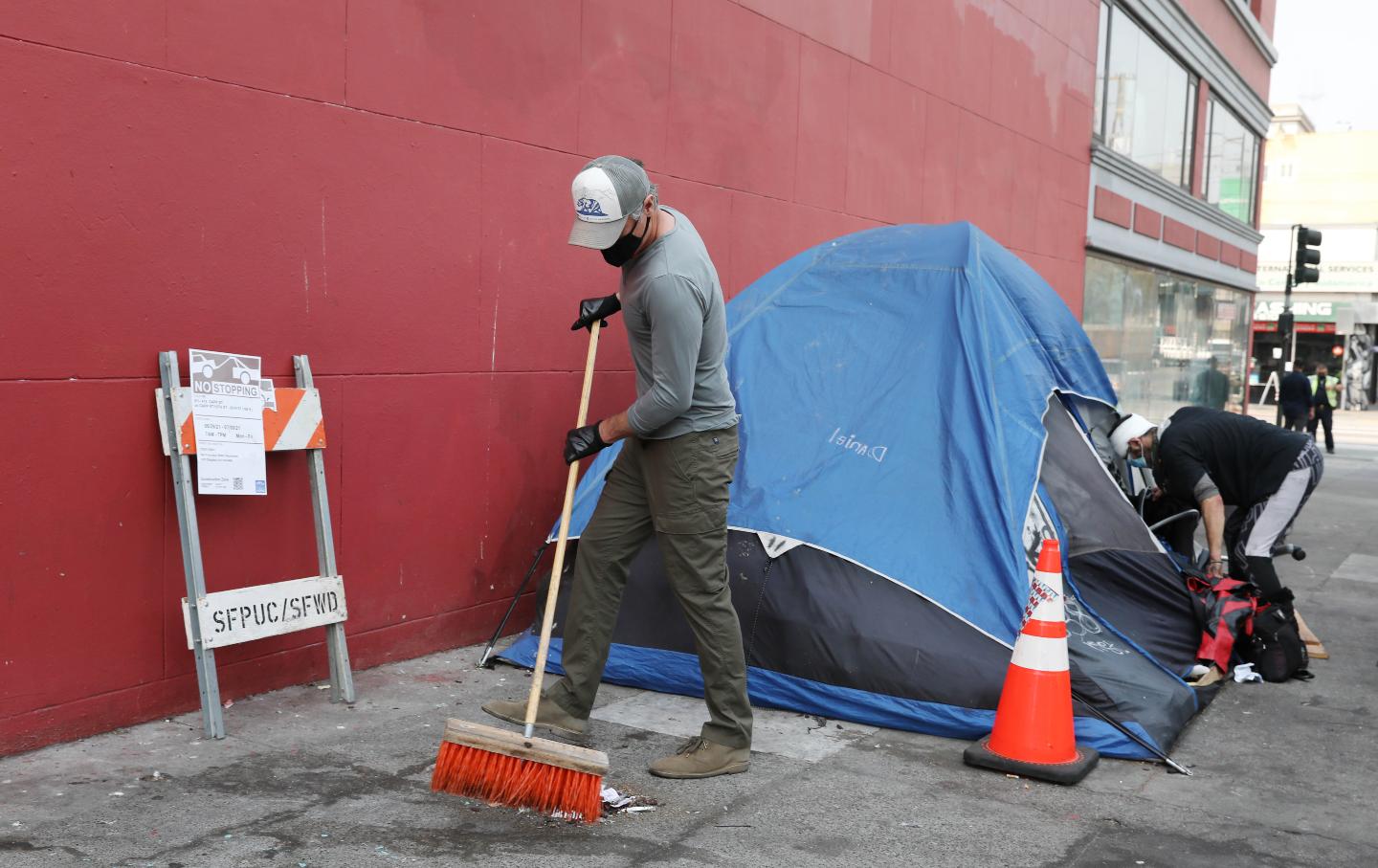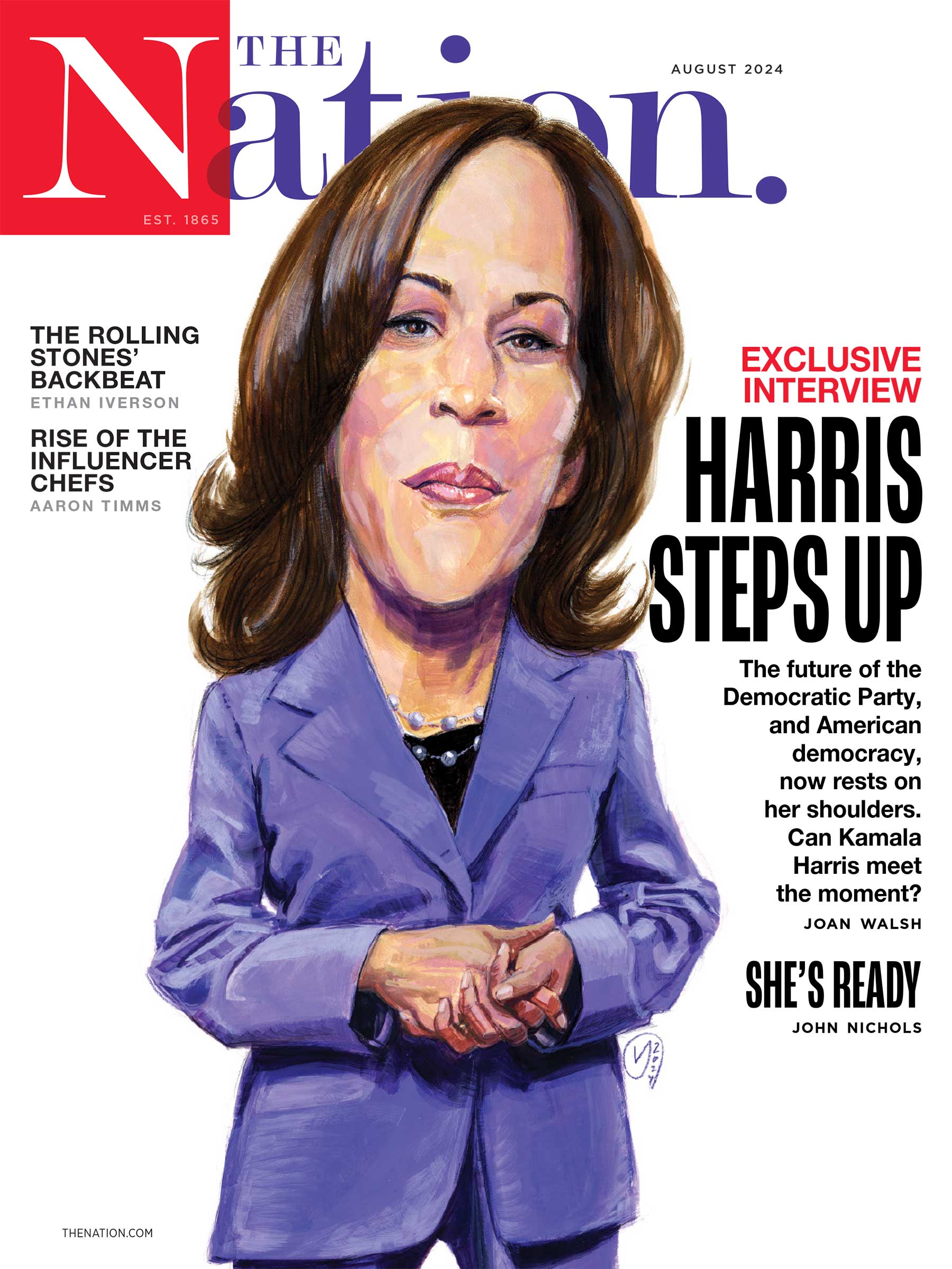Politics
/
August 1, 2024
The governor’s order to clear California’s encampments will please his constituents and perpetuate the homeless crisis.

Governor Newsom visits a homeless encampment on 19th Street in 2021.
(Photo: Getty Images)
California’s two most marginalized constituencies, the homeless and the incarcerated, each represent about half a percent of the state’s 39 million residents. Both groups are vulnerable to abuse and premature death, suffer from deprivation of vital resources, and have little say in political discussions about their futures. Black people are significantly overrepresented in each category.
There is a reason the latter population goes largely unnoticed and the former is considered the state’s primary problem, synonymous with the supposed crisis of California itself, endlessly mocked by the right, and invoked as the reason for the so-called “California exodus” of resident businesses and workers. It’s very simple: We can all see how bad it is. Most Californians will never set foot in a prison or jail, but the stark reality of the homeless crisis is upon us all; witnessed from our sidewalks and street corners, our underpasses and our parks. In a way, it is fitting that those who have failed to meet the punitive requirements to even rent an apartment in this state must pitch their tents on public land. Their presence there attests to a community failure that cannot be ignored.
Housing people is a way to get them out of sight, but it’s slow and laborious work, and officials’ preferred method has often been something quicker: clearing out encampments. This is magical thinking as politics: the idea that homelessness can be addressed simply by seizing homeless people’s belongings, abandoning their makeshift shelters, and forcing them to move on. Sometimes, clearings carry civil or criminal penalties: San Diego Mayor Todd Gloria has adopted a policy of “progressive enforcement,” arresting homeless people and forcing them into shelters. “If they don’t want to use them, it’s a free country, I understand that,” he said. “But it’s not without consequences.”
Cleanups happen every day, on streets across the state, as a matter of course. But last week, their flawed and brutal logic was ratified at the highest levels of California government, when Gov. Gavin Newsom used his executive power to order officials across the state to clear homeless encampments from public lands.
Newsom’s order follows the recent Grants Pass vs. Johnson The Supreme Court decision, which found that suing homeless people for sleeping rough doesn’t violate the Eighth Amendment’s prohibition on cruel and unusual punishment, even if they have nowhere else to go, is a step in the right direction. Some state agencies under the governor’s command are poised to act immediately. And while the governor can’t force local officials to clear out encampments in their cities, his diktat increases the pressure on them. “Enough with the excuses… Now it’s time for locals to do their job,” Newsom wrote in a tweet accompanying the announcement. Some leaders, like Los Angeles Mayor Karen Bass, who has made a transitional housing initiative her calling card, albeit with limited success, may be reluctant to step up removal and enforcement efforts. Others, like London Breed of San Francisco, who has used her public position to fulfill what appears to be a personal desire to never set eyes on a homeless person living in public, will be eager to follow suit. “San Francisco is already doing what the governor is asking,” she wrote last Thursday.
In 2022, the week the Roberts Supreme Court ruled on both Dobbiaco AND West Virginia vs. EPANewsom has denounced the same judges who ruled in Grants Pass as “determined to turn back the clock and ignore reality.” But “ignoring reality” is exactly what this executive order does. We’re getting at biological imperatives: the need for sleep; the fact that a person can’t just disappear, no matter how many times you kick them out of their tent or take their few belongings. A recent RAND study of homeless people in Los Angeles found that cleared encampments typically returned within a few months, providing just more evidence that this strategy isn’t a long-term solution.
Current problem

As Newsom sets his sights on the White House in 2028 or 2032, he knows that California’s housing and homelessness crisis is a huge political liability. His executive order provides the governor with a retort ready for a presidential debate in a few years. It’s a predictable continuation of the two-party game Newsom has played his entire career and is expected to elevate him to national office.
In his executive order, the governor points to the billions of dollars already invested in homeless shelters and other resources during his tenure, as if to argue that an additional approach is needed: a dash of law enforcement alongside services, a little stick next to the carrot. But big numbers don’t mean the money is well spent. California would need about 110,000 additional beds to house all of its homeless people on a given night, and the shelter available may be inadequate, unsafe, or exclusive. Scams abound: A Los Angeles homeless shelter contractor was recently indicted for embezzling millions of dollars to buy his girlfriend, among other things, an Hermès Birkin bag. Last week, the Los Angeles city comptroller found that a contractor who was supposed to provide nutritious meals to the homeless was instead serving up instant ramen. Meanwhile, the state has failed to establish tenant protections that could prevent people from falling into homelessness in the first place, and it has made only scant progress in building affordable housing. As the nonprofit Alliance of Californians for Community Empowerment has pointed out, Newsom and the state government have funded just 12 percent of a 2022 plan to build 1 million new affordable homes by 2030, and lawmakers have cut a cool $1 billion from this year’s housing and homelessness budget. Those mistakes belong to the state, but homeless people are to blame, and homeless people will get the punishment now.
Supporters of Newsom’s executive order may point out that he is trying hard to emphasize “dignity” and “humanity” as necessary prerequisites for enforcement, but there’s no getting around it: This order means more people will lose possessions like dentures, ID cards, and family heirlooms. These seizures and removals are traumatic and destabilizing for people who may already be struggling with mental health issues. They only make long-term homelessness worse and will almost certainly drag homeless people into the jaws of the criminal justice system. It doesn’t seem too dramatic to say that the end result of this order will be more homeless people in prison. And if some of California’s nearly 200,000 homeless citizens end up joining the ranks of its inmates; if some people disappear off the streets only to end up in a cell, out of sight of the public, well, for many people, that will be a success, and Newsom will be applauded. But it will be a moral and political failure, even if we never see it again.
Can we count on you?
In the upcoming election, the fate of our democracy and basic civil rights are at stake. The conservative architects of Project 2025 are planning to institutionalize Donald Trump’s authoritarian vision at every level of government if he wins.
We have already witnessed events that fill us with both terror and cautious optimism, in all of this, The nation has been a bulwark against misinformation and a champion of bold, principled perspectives. Our dedicated writers sat down with Kamala Harris and Bernie Sanders for interviews, parsed J.D. Vance’s shallow right-wing populist appeals, and discussed the path to a Democratic victory in November.
Stories like these and the one you just read are vital at this critical moment in our country’s history. Now more than ever, we need independent, lucid, and deeply researched journalism to make sense of headlines and separate fact from fiction. Donate today and join our 160-year legacy of speaking truth to power and elevating the voices of grassroots advocates.
Throughout 2024, and in what will likely be the defining election of our lifetimes, we need your support to continue publishing the eye-opening journalism you rely on.
Thank you,
The editors of The nation





